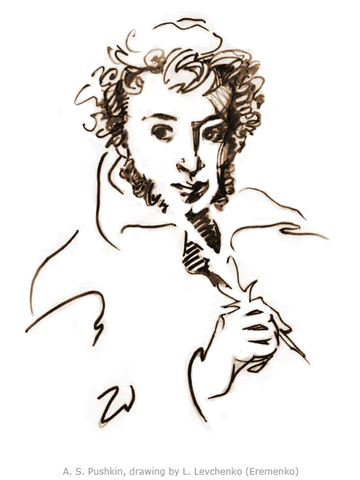Aleksandr Pushkin

Aleksandr Pushkin is arguably the most iconic Russian writer. Apart from being a prolific and diverse author he is considered to be the creator of the modern Russian literary language.
He was born in 1799 into a family of a nobleman, had access to a big library, and as a child was surrounded by great writers of the time. After graduating from the prestigious Imperial Lyceum in 1817, he moved to St. Petersburg, which was then the capital of Russia, where he was part of high society life and wrote his first big piece—the poem “Ruslan and Lyudmila”.
Aleksandr Pushkin’s literary legacy encompasses a broad range of topics, all of them come from his diverse biography: his African origins, his affection towards his nanny, Arina Rodionovna, and his heartbreaking romances and disillusionment.
His freethinking character also influenced his creative work: his epigrams on Tsar Alexander I led him to exile in the far-flung south of Russia. Aleksandr Pushkin’s life aloof from the world brought a new twist to his work: a romantic attitude towards life and a desire to examine the inner world of the human soul was reflected in extremely expressive yet laconic lyrics which became the signature style of the poet and brought him great acclaim in Russia.
It is here, amid the picturesque tranquility of the Russian south, that Aleksandr Pushkin wrote his Romantic poems “The Captive of the Caucasus” and “The Fountain of Bakhchisaray” and also came up with the idea for one of his best-known works—“Eugene Onegin”. The novel in verse was aptly labeled the encyclopedia of Russian life. Touching upon a wide range of issues, it is full of accurate portraits of social characters, tells about all-encompassing passion, deep remorse, the ability to love, and conventions of social life. The innovative form of the poem has come to be known as the "Onegin stanza".
At the end of his life his deep inner affections, which were the basis of his poetry, burst into reality. Aleksandr Pushkin died in a duel in protection of his wife’s honor at the age of 37.
Learn more:
 rt.com
rt.com


